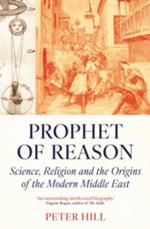An eighteen-year-old reads Voltaire and Volney and loses his religion. It’s 1818 in Ottoman Damietta and Muslims and Christians are questioning everything. Mikha’il Mishaqa walks away from the Catholic Church. Thirty years later, in 1848, he announces his new faith: Evangelical Protestantism, scandalising his community and kicking off a battle of polemics. The world darkens. In 1860 Mishaqa barely escapes death in the most notorious event in Damascus: a massacre of several thousand Christians. We are presented with a paradox: rational secularism and violent religious sectarianism came of age at the same time. By tracing Mishaqa’s life through this tumultuous era, where empires jostled for control, Peter Hill answers the question: What did people in the Middle East actually believe? It’s a world where one man could be a Sunni, Jew and Orthodox Christian in the span of his life and German missionaries walked naked in the streets of Valletta.

Prophet of reason : science, religion and the origins of the modern Middle East
ISBN: 9780861547364
Format: Paperback
Publisher: Oneworld (UBD)
Origin: GB
Release Date: July, 2024


